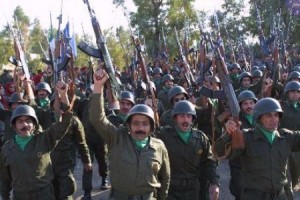 The bloodshed, condemned by the�United Nations, Britain and the United States, took place hours after a mortar bomb attack on the camp which the dissident Mujahadin-e-Khalq (MEK) group blamed on the Iraqi army. An adviser to Iraqi Prime Minister Nuri al-Maliki dismissed the accusations as baseless.
The bloodshed, condemned by the�United Nations, Britain and the United States, took place hours after a mortar bomb attack on the camp which the dissident Mujahadin-e-Khalq (MEK) group blamed on the Iraqi army. An adviser to Iraqi Prime Minister Nuri al-Maliki dismissed the accusations as baseless.Two security sources said on Sunday that the army and special forces had opened fire on residents who stormed a post at the entrance to Camp Ashraf - a site that Iraq's government, which is close to Iranian authorities, wants closed down.
The sources said at least 19 people were killed, 52 wounded and 38 arrested and that they believed residents were not armed. But a U.N. statement had a death toll figure of 47, while the MEK said 52 of its roughly 100 members at the camp were killed.
U.N. spokeswoman Elaine Nabaa said on Monday the team from the organization's�Iraq�office had gone to the camp to assess the humanitarian situation, without giving further details. She said it was the Iraqi government's responsibility to investigate what had happened.
British Foreign Office Minister Alistair Burt said he was appalled by the violence. "We condemn this utterly," he said in a statement on Monday, urging the Iraqi government to protect the camp's remaining residents.
U.N. Secretary General Ban Ki-moon said on Sunday the�United Nations�"deplores the tragic events at Camp Ashraf" and called on Baghdad to investigate the incident. The U.S. embassy in Iraq condemned "the terrible events" at the camp.
MEK, which the U.S. State Department removed from its list of terrorist organizations last year, wants Iran's clerical leaders overthrown and fought on former Iraqi dictator Saddam Hussein's side during the�Iran-Iraq war in 1980s.
The group, also known as the People's Mujahideen Organisation of�Iran, is no longer welcome in Iraq under the Shi'ite Muslim-dominated government that came to power after U.S.-led forces toppled Sunni leader Saddam in 2003.
Most of the group was relocated last year to a former U.S. military compound in western Baghdad. Mortar attacks on the facility took place in February and June and, at the time, MEK blamed Iran's Quds force - an elite unit of the Revolutionary Guards with a special focus on foreign operations.
By Reuters
The Iran Project is not responsible for the content of quoted articles.










